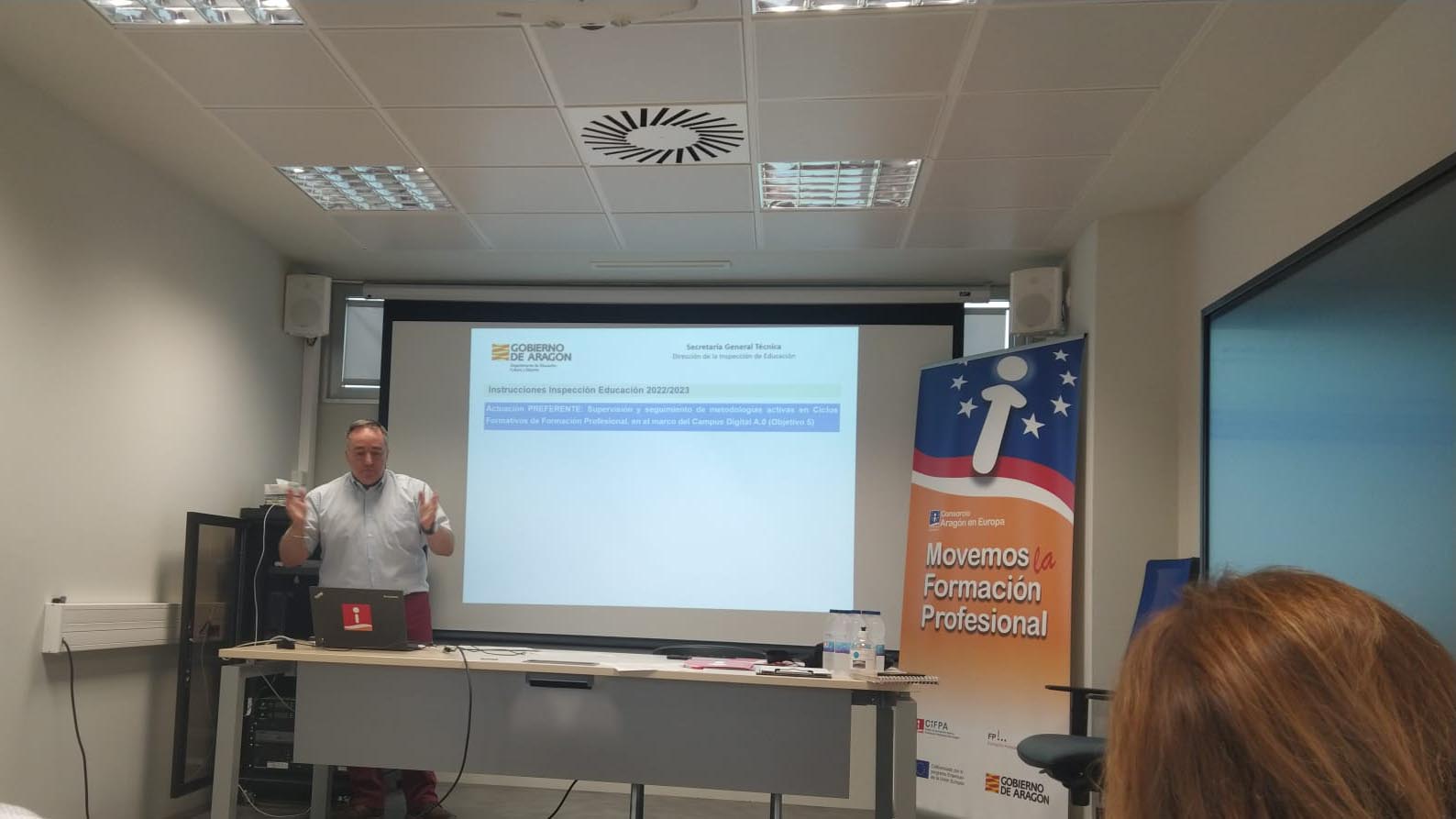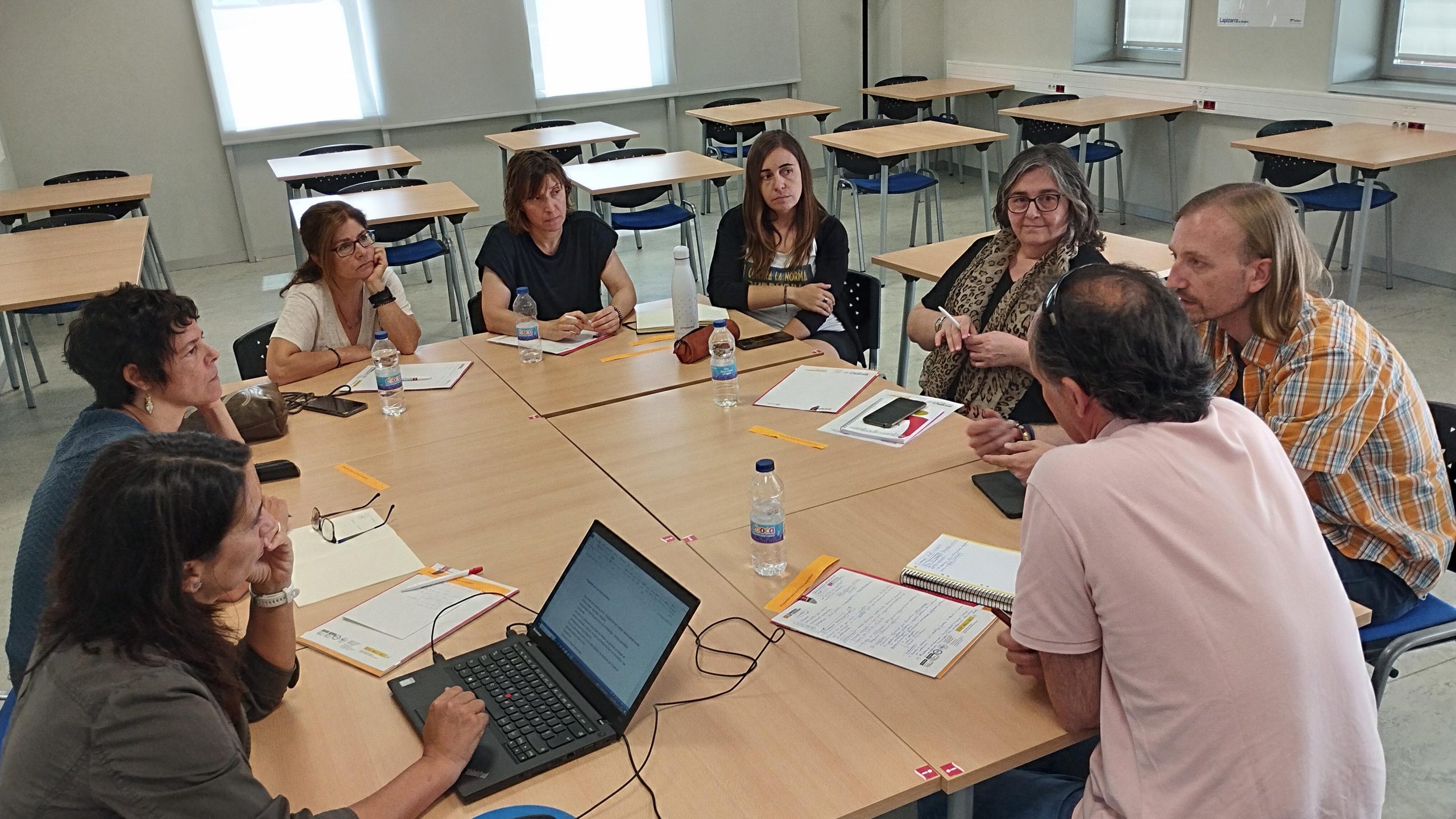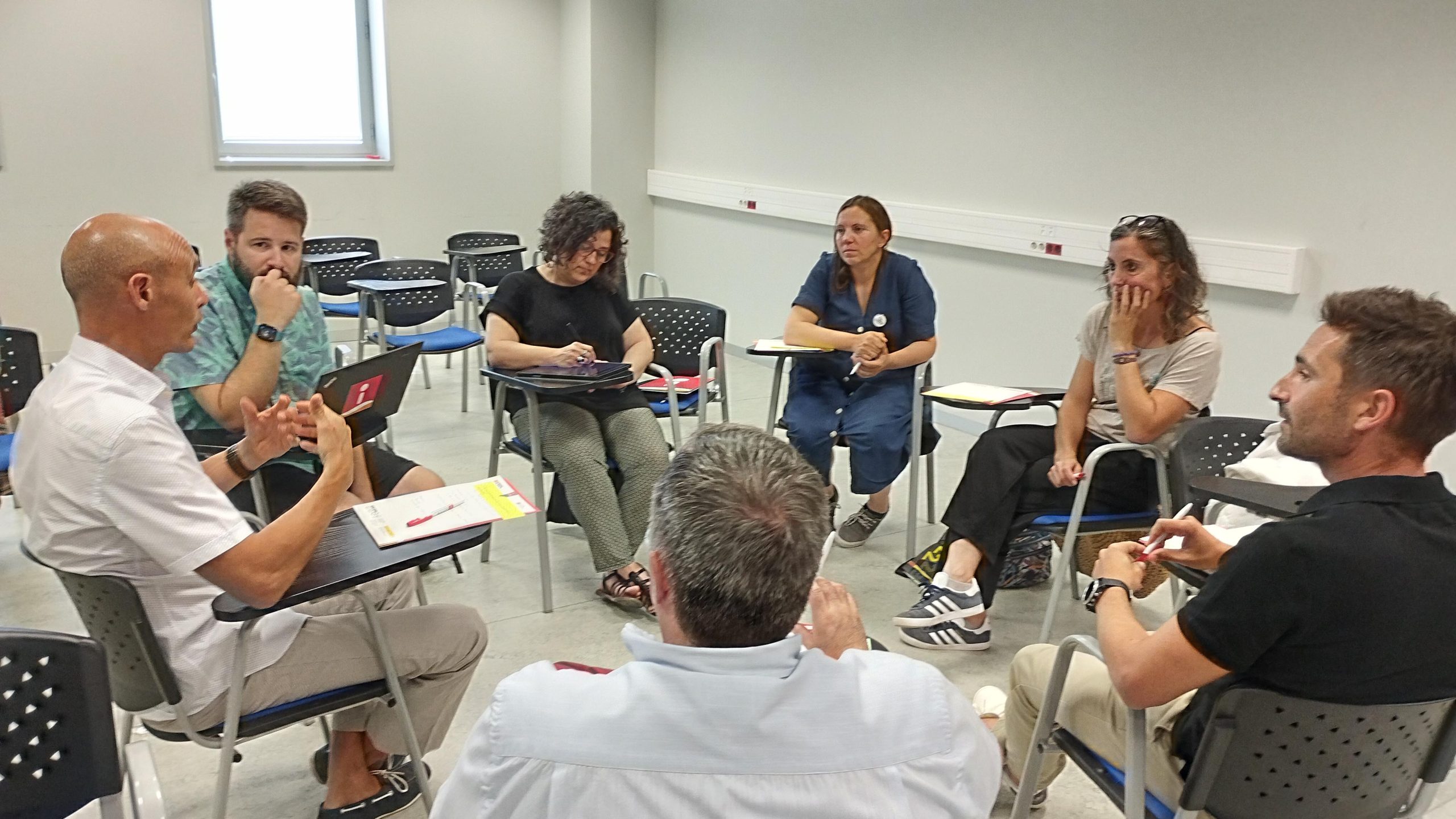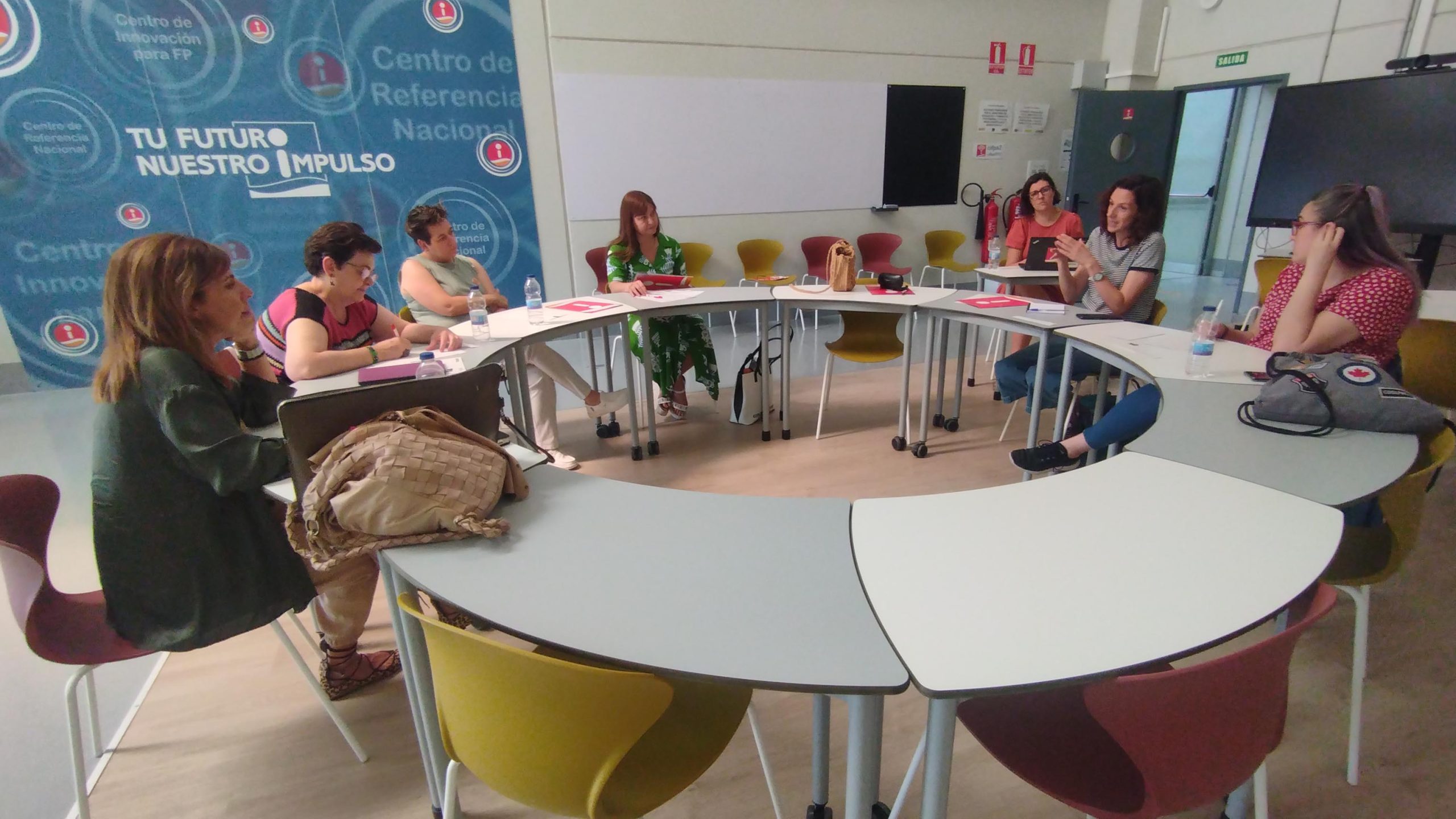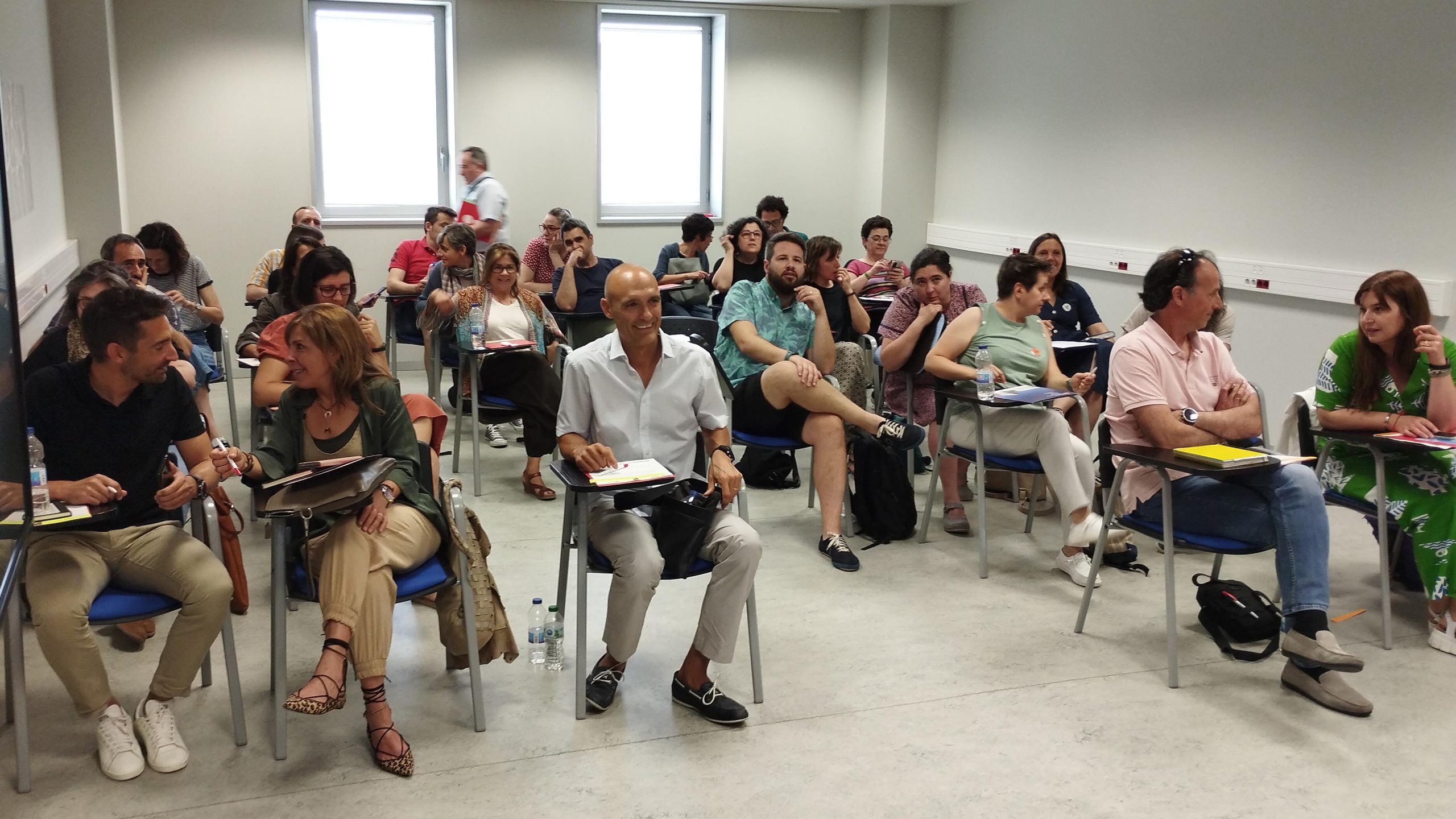
12 Jun Conference: Cycles A.0. Three years of challenges in Aragón
Teachers from several professional families of Vocational Training have participated in the conference "Cycles A.0. Three years of challenges in Aragon" in which the development and results of the implementation of active methodologies (Cycles A.0) in VET have been analyzed.
The A.0 cycles is an initiative of the Directorate General for Innovation and Vocational Training to support the transformation of the teaching and learning model towards an active methodology, mainly based on Collaborative Learning based on Challenges (ACbR), which helps to better and more fully prepare VET students.
The meeting, held at the CIFPA, was attended by Óscar Sánchez, regional inspector of Education, who reported on the draft report focused on the operation of the A.0 Cycles. This is an action included in the General Plan of Action of the Educational Inspection, by which the supervision and monitoring of the A.0 cycles of modality B implemented in the courses 2020-21 and 2021-22 in centers of the three provinces has been carried out.
The intervention of the Inspection team consisted of classroom visits, review of documentation and interviews with management teams, coordinators, participating teachers and students of the cycles in which active methodologies are used.
The Educational Inspection pursues two objectives in this action: the development of a clear instruction on the operation of the A.0 cycles and the detection of good practices and positive aspects of the application of active methodologies in the different authorized projects.
The first conclusion of this report is that the A.0 Cycles teachers do an outstanding job, dedicating more hours than they have assigned in their timetable. The coordination and preparation of activities and tasks requires an important effort and dedication. The Education Inspectorate has expressed its gratitude for the work that these teachers have done over the years to support their students in their integral education.
The draft of this report was presented at this meeting, which includes the following conclusions:
- Teachers emphasize that this methodology favors attention to diversity through co-teaching.
- They consider that with the implementation of active methodologies, students are more motivated; the dedication in the classroom to transversal competencies such as teamwork, communication, leadership, etc., brings students closer to the reality of the company.
- It is observed that, in some centers, the A.0 cycles are not part of the Educational Project of the Center (PEC) or the Curricular Project (PC).
- In most of the centers that have implemented this methodology, the teaching staff is temporary.
- The teachers who free hours in the third quarter due to the incorporation of students to the FCT, in many cases, do not participate in the project in those hours that are freed.
- In most cases, the school counselor does not actively participate in the A.0 Cycles project.
- Some centers have been detected in which some of the 5 hours of coordination are destined to carry out splitting in different courses of the project.
- Most of the centers indicate that the training received by the teaching staff in active methodologies is still not sufficient to be able to carry out the project.
- It is necessary to inform the students about the methodology with which they will work throughout the course.
- In general, students are satisfied with the methodology used in the A.0 Cycles.
- In general, teachers consider that this methodology better prepares students for their labor market insertion.
- Regarding the didactic programs, some centers are prepared jointly by the teaching team and, in other cases, individually.
- With respect to the evaluation of transversal competencies, except in one center, there are no evaluation criteria associated with transversal competencies.
- In half of the projects supervised there is no coordination between modules.
- Except for one center that needs to improve in the implementation of this methodology, in general the students are satisfied with the learning achieved and with the work environment. Moreover, in the interviews they stated that they enjoyed participating in this educational experience.
- The teachers point out that it is difficult to apply the methodology in large groups.
Based on these conclusions, the educational inspectorate has submitted the following proposals for action to the Directorate General for Innovation and Vocational Training:
- Update, at least, the Curricular Projects of the training cycles that have Project A.0 so that it is reflected in the same.
- The positions offered to interim teachers should be outlined.
- The positions offered to interim teachers should be considered as "vacancies for temporary stabilization of teaching staff (3-year vacancies)".
- The Centers should give more publicity on their Web site about the Cycles that work with active methodologies, clearly specifying what they consist of.
- The didactic programs of the modules that participate in the Project should clearly and concretely reflect how the recovery, evaluation and grading of the modules is carried out.
- The individual or joint elaboration of the programming by the teaching team that participates in Project A.0 should be a center decision, respecting its autonomy.
- It is considered that transversal competences are very important in Vocational Training and, in active methodologies, even more so. However, most of the curricula do not include them, therefore, in the regulation of the A.0 this aspect should be reflected.
- Coordination mechanisms should be established between the different modules.
- Training in active methodologies, although currently mandatory for teachers joining these projects, should take place in July or, at the latest, in the first week of September.
- It is considered that the type of training in these methodologies should be modified, making face-to-face courses in which transversal competencies are worked on and teachers could learn and see how A.0 practices are carried out in other centers.
- Training should be planned for teachers who join the school after the start of the school year, in addition to the training they may receive at the center itself.
- It is considered that the teaching hours granted for coordination should be established by regulation since this methodology requires planning, preparation and coordination time, and being highly valued by teachers and students, it runs the risk of not being applied if there is no recognition with personal resources.
- This type of methodology requires, among other things, time flexibility. In this way, an irregular distribution of the working day should be facilitated, which, although it does appear in the regulations for Integrated Vocational Training Centers, it does not appear in those of the IESs.
- In centers that have Cycles in several shifts, the A.0 methodology should focus on some of them and not on all of them and thus respond to the diversity of student interests.
In this meeting, issues related to the actions to be carried out with students with validated modules, with work conciliation, with partial enrollment or with loss of continuous evaluation arose. Both the Educational Inspection and the teachers participating in the meeting indicated that it is convenient to establish complementary hours for the teachers participating in the A.0 Cycles in order to facilitate the coordination work.
The need to inform and publish all the information related to the A.0 Cycles from the Department of Education and on the websites of the centers, so that both students and families are aware of their implementation and operation, was emphasized.
This day ended with several working tables and the presentation of a preview of what will be the second book dedicated to the ACbR methodology, which is the result of the work of a working group composed of Vocational Training teachers with experience in A.0 Cycles.


